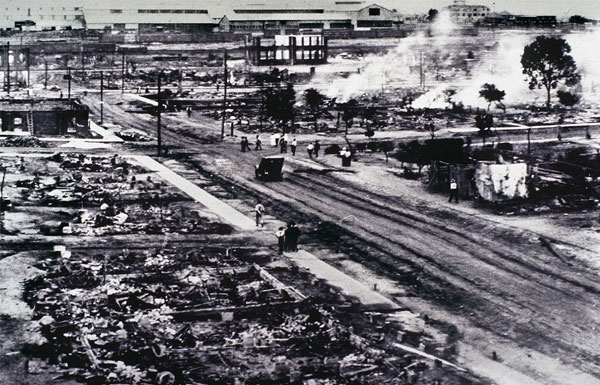According to the book, They Came Searching, by Eddie Faye Gates, from pre-statehood days to the present, people have come to Tulsa seeking a better way of life. Tulsa had mineral-rich lands and people of all races and nationalities. People from all over the United States went there for a better way of life. Native Americans were already there. Some were native to the area and others came as a result of a forced removal from other areas.
After Reconstruction failed Black people, the grandparents and parents of the Tulsa pioneers set out to find The Promised Land. The author, Eddie Faye Gates wrote, “It was not in the Deep South where they had witnessed such colossal levels of political, economic, and social oppression including systematic, and increasingly routine lynchings.” They wound up in Oklahoma.
Rich white oil men invested in Oklahoma’s oil industry. Oil became the state’s most important resource for decades. Next, were the railroad men. They built the rails to carry the rich oil to other states. They were followed by farmers, religious people, and many others seeking a better life in The Promised Land.
White Southerners couldn’t get over the Civil War and their perceived noble way of life. They took back control of the South and Black people were the target of their anger. For nearly 100 years, Black people would undergo bondage for a second time.
According to some Black pioneers the author interviewed for her book, Greenwood had clothing stores, hotels, and many other businesses. Black Tulsa had an abundance of hotels. Black builders built many nice homes for the Black residents. Black people didn’t have public transportation therefore; one of the Black men bought a jitney transportation system. For a nickel Black people could ride. After he bought his second jitney, he was framed and sent to prison.
The worst thing that happened to Black people in Tulsa’s history was the race riot of 1921. It was May 31, 1921 when nineteen year old Dick Rowland, a local bootblack (shoe shiner) went into the building to use the public restroom. This was the only public restroom for Black people. He had to take the elevator to the 4th floor (see previous post dated May, 7, 2024).
Dick Rowland’s father owned a lot of property in North Tulsa and in other areas. His son, Dick, was well off and didn’t have to work. He chose to work. One witness described the terrible riot that started in the wee hours of the morning on May 31, 1921.Homes and businesses were burned. She said Black people were running away from the fire. Women were dragging their crying small children by the hand. Men were rounded up and taken to the Convention Center, Fairgrounds, churches, and schools for holding. White mobs went on the rampage. They looted and burned Tulsa’s Greenwood district known as Little Africa.
According to another eye witness interviewed, after Dick Rowland accidently bumped into the teen-aged elevator operator, rumors spread by white supremacists that he had assaulted her. The Black residents did not believe these rumors.
Prior to the riot, white men had been drinking, cursing, and shooting their guns in the air. They went to the court house about 9 p.m. that awful night. Their intent was to kidnap Dick Rowland from jail and lynch him. When Black men heard the plot, they armed themselves and were there also. A white man tried to take a gun from a Black man and in the struggle the gun went off. After the three day riot, Greenwood looked like a war zone. White women were guilty of participating in the riot as well.
It is not known how many people died as the result of the riot. Poor record keeping added to this. According to the American Red Cross, the body count could have been as high as three hundred. The Black funeral home was burned, and some bodies were dumped in the Arkansas River or incinerated.
The 17-year-old elevator operator, Sarah Page, did not press charges against 19-year-old Dick Rowland. Some residents thought there was a relationship between the two. He was released and left Oklahoma. It was reported the sheriff took him to Kansas. It was reported Sarah Page left for Kansas and they briefly reunited before going their separate ways.
Francie Mae. March 29, 2024
Reference
Gates, Eddie Faye. 1997. They Came Searching. How Black Sought the Promised Land in Tulsa. First Edition. Austin, Texas. Eakin Press.
